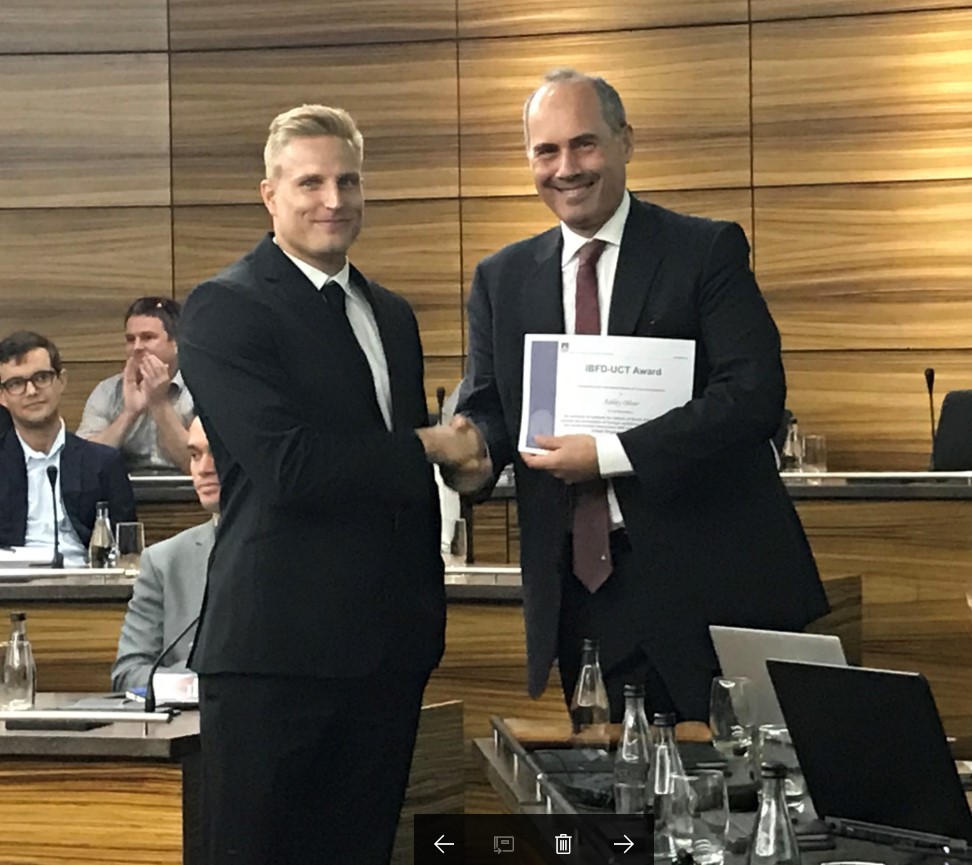A dose of International Tax expertise

UCT Masters students get a dose of International Tax expertise

The seminar included the presentation of the annual IBFD/UCT Prize in International Tax, awarded to Ashley Olivier for his master’s dissertation (LLM) on An analysis of options for reform of South Africa’s unilateral income tax exemption of foreign pensions, with an emphasis on the cross-border interaction with pensions derived from the United Kingdom and Germany.

Prof Pistone presents the annual IBFD/UCT Prize in International Tax award to Ashley Olivier
The UCT specialisation in International Taxation, offered as either a Master of Law (LLM) or a Master of Commerce (MCom), ensures that tax issues are investigated within an inclusive framework.
The UCT Tax Unit for Fiscal Research, a joint endeavour between the Faculties of Law and Commerce, is celebrating five years of fruitful and mutually beneficial partnership and exchange with the IBFD. In operation since 1938, the IBFD is a self-funded NPO focused on developing and disseminating knowledge about international tax. Prof Pistone points out that the UCT Tax Unit’s reputation is very much on the rise – with two of its academic specialists currently serving as Managing Editor and Chief Editor respectively of the world’s most important journals on tax, namely the World Tax Journal (Associate Professor Craig West) and the Bulletin for International Taxation (Associate Professor Johann Hattingh).

Associate Prof West, Associate Prof Hattingh, Prof Andrade, Prof Roeleveld and Prof Pistone
It is evident, says Prof Pistone that recent news and global events have increasingly put tax and tax issues into the headlines, and it is becoming ever more critical that tax qualifications at a local level include training in tax issues at an international level. The social implications of tax are increasingly being recognised, along with the implications of the socio-economic impacts of shifts and changes in any country’s tax base. Tax is increasingly understood in the context of nations pursuing policy goals. Non-profits and civil society organisations are thus increasingly challenging governments and multi-nationals about taxation, and the relative positioning of the primary tax burden. Additionally, there is a growing understanding of the implications of corporate tax avoidance on individual taxpayers.
As Academic Chair of IBFD, Prof Pistone has a specific interest in contributing to the development of skills in countries where there may be excellent knowledge of taxation, but limited capacity to implement and administer the mechanisms and infrastructure required to collect tax, from both individuals and corporates. It is critical, says Pistone, that countries not only have robust tax systems but that they have the capacity to use these systems.
The UCT Masters in International Taxation is of particular significance as it is one of the few specialist programmes that incorporate a global dimension along with a local or national perspective. It is the only postgraduate tax law programme in South Africa with international instructors and experts contributing their expertise in international tax. In Prof Pistone’s view, it is essential for a national fiscus to have sustainable rule of law as the framework in which a tax regime is structured – and he sees the programme as an important contribution to understanding tax within the legal framework.